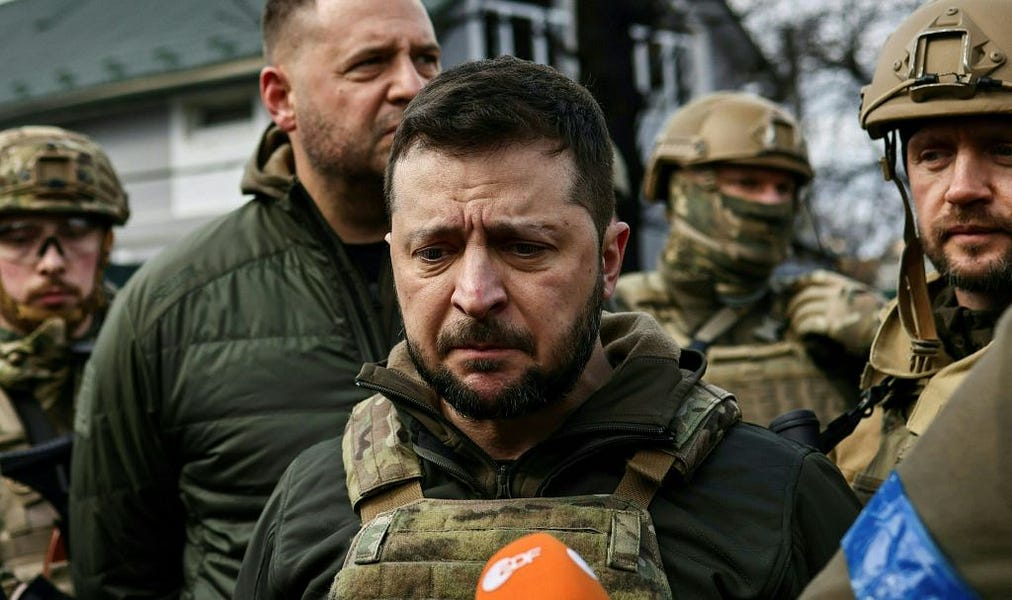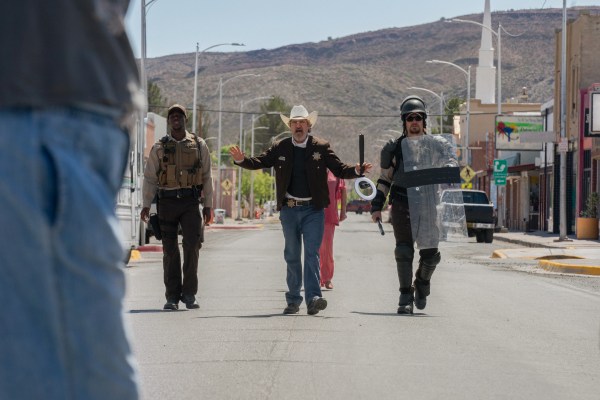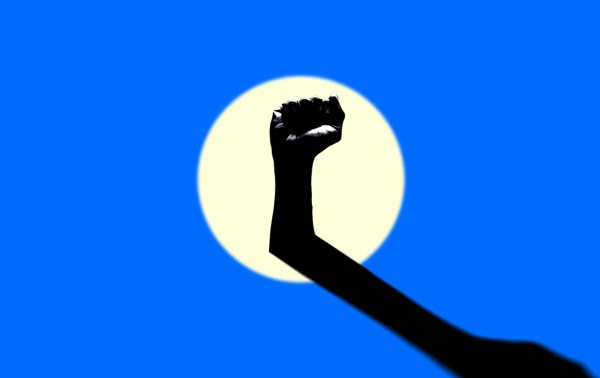When COVID hit Ukraine I was living in a small apartment near the center of Kyiv, but after a few weeks of cabin fever one of my wife’s friends let us house-sit at the edge of a prosperous suburb called Bucha. It was a great place to hang out while the world shut down: the neighborhood was mostly newly built upper-middle-class homes sitting in a large pine forest.
When Russia tried to seize Kyiv in February I knew, intellectually, that the towns of Bucha and Hostomel and Irpin were at the epicenter of the fighting. But after a week or two of knowing this, a video of the aftermath of a battle popped into my news feed a few weeks ago, right before I had a job interview. I recognized a storefront in the background—a fierce fight had happened right down my old street! During the interview my brain was flooded with worry while I stumbled over my answers to anodyne questions: worries about the kids who had sometimes come out to pet my dog in front of that store; wondering if my next-door neighbor managed to get his family out of town. I had thought about them before, of course, but the video galvanized my neurons in a way that just “knowing” didn’t.
The world is experiencing something similar with Bucha now, too. We already knew, intellectually, that the Russian army was committing atrocities in Ukraine. We already knew that they were shooting civilians, attacking residential areas with cluster munitions, kidnapping people, and so on. In February, U.S. intelligence reported that Russian forces had a “kill list” of Ukrainians to be killed or captured. National Security Adviser Jake Sullivan told us we should expect an “an even greater form of brutality because this will not simply be some conventional war between two armies,” but “a war waged by Russia on the Ukrainian people, to repress them, to crush them, to harm them.”
A stream of images and reports of the atrocities inflicted by the Russian army in Bucha have emerged over the last few days. Murders, rapes, and looting probably happened regularly while the Russian troops were fighting, but it looks like they engaged in a final atrocious spree on their way out of town. A video posted over the weekend shows dozens of men lying dead on a Bucha street, one of them with his hands visibly bound behind him. There is a mass grave nearby. It looks like the Russians had their interrogation/prison just around the corner from a municipal park, and shot everyone they had detained on the way out.
Because of the brilliant success of Ukrainian forces so far, most of the gruesome images that the world has seen from the war have been of Russian dead, burning Russian tanks and other vehicles. There has been so much of this kind of content that I suspect some Americans almost forgot how brutally the Russian army was behaving, of what could happen when the soldiers that Ukrainians didn’t kill got their hands on Ukrainian civilians. The videos, images, and reports out of Bucha are only going to get worse as more execution sites are found, as more Ukrainians talk about their experiences or check on their neighbors and find that they have been murdered.
The Bucha massacre is just the first of a wave of atrocities that will be unveiled as Russia pulls back in the north to get ready for a more concentrated offensive in the southeast. Bucha is a town popular with commuters, and before the war you could take a car from the center of Kyiv to Bucha in about a half hour. This means Western journalists based in Kyiv can get there relatively easily. They can confirm the stories of mass killings and take photos of civilian corpses in the street, and these photos can go directly into articles and on television screens without any intermediary. There are other atrocities taking place elsewhere in Ukraine that are less well-documented. Mariupol, for example, has been mostly cut off from communications as the Russians pummeled the city, but the reports trickling out beggar belief.
The world is going to spend a week or two fixating on the Bucha massacre, perhaps longer as more and more horrific images and videos and reports come out. Perhaps this sudden rush of images about the reality of a Russian occupation will result in important changes in the near future, like a ban on Russian hydrocarbon exports to Europe. We have institutions, Ukrainian and others, that are built to investigate and prosecute war crimes even if the eyes of the world are distracted, and their investigation results might one day result in prosecutions and capture the world’s attention again. The truth of the matter is that unless we have lost someone ourselves or experienced the atrocity directly, we non-Ukrainians will probably mostly return to “normal” in a few months at the most. This return to “normal” is not necessarily a bad thing; we humans can’t live our lives or make rational choices or be an effective help when we are charged with emotion. However, we at least have an obligation to think clearly and rationally about the atrocities that have happened, and about those that will happen in the future and how they might be prevented.
The Western public largely failed to do this in Syria. There were a few cruise missile strikes (or threats), some sanctions at the margins, but basically the world lost interest. One atrocity has blended into another. When the Syrian government insisted in 2013 that the Ghouta nerve gas attack had been perpetrated by the Syrian opposition, it should have told us that there would be more such attacks as long as a viable opposition existed. Maybe if we had penalized and sanctioned Russia earlier over its contribution to the Syrian debacle we could have prevented Bucha. Maybe if European countries hadn’t continued to sell military items to Russia even after Putin invaded Ukraine in 2014, a smaller-scale invasion with its own collection of atrocities, the current expanded invasion and atrocities wouldn’t have happened or would have been even less effective.
Russian disinformation-mongers and their useful idiots will certainly try to jade us about reports of their atrocities in Ukraine, to wear us down with denials and whataboutism. The Russian Defense Ministry is already calling all the reports, photos, videos out of Bucha “a production of the Kyiv regime for the Western media.” This response was inevitable, and there are already Russian stories of false-flag killings, of the Ukrainian security services moving corpses out to Bucha, etc. The full-throated denial phase may not last very long as the evidence pours in, and there are already indications that Russia is switching from a “it wasn’t us!” narrative to a “they deserved it!” narrative. On Sunday, as headlines across the world were telling readers of the Bucha massacre, the Russian state news agency RIA Novosti published a long opinion piece by Timofei Sergeitsev, a Russian “political consultant” with experience working in Ukraine. Sergeitsev wrote about the form that “denazification” needs to take in Ukraine: The Ukrainian military should be destroyed as much as possible, for participating in the “genocide of the Russian people,” and the Ukrainian elite should be totally replaced, lustrated. He then calls for the direct punishment of the Ukrainian population:
However, in addition to those at the top, a significant part of the [Ukrainian] masses, who ware passive Nazis, accomplices of Nazism, are also guilty. They supported Nazi power and indulged it. The just punishment of this part of the population is only possible through their bearing the inevitable hardships of a just war against the Nazi system, conducted as carefully and prudently as possible with relation to civilians.
You can see how Sergeitsev inserts a qualification that he is not calling for attacks on civilians right after he called for attacks on civilians. The essay accuses Ukraine of genocide against Russians, but also declares that: “Denazification will inevitably also be a de-Ukrainization.”
Sergeitsev is not trying to retroactively justify the Bucha massacre, he is laying out a future program of mass murder in Ukraine followed by “re-education” of the survivors. What would he include among the “inevitable hardships” of the war that the Ukrainian masses should endure as part of their “just punishment”? Chemical weapons attacks? Possibly, but we Westerners sometimes obsess over possible atrocities enabled by rare technologies (chemical, nuclear) rather than the atrocious potential of conventional weapons. The main tool of the Katyn massacre was the pistol. In Rwanda, the Hutu genociders used machetes. In Bucha the tools were probably mostly the rifles the Russian soldiers carried into Ukraine.
As the world grapples with the images out of Bucha and those atrocities we have yet to learn about, we should try and imagine other ways Russian forces can do terrible things and find a way to prevent them. For example: the terror-bombing of cities. The Ukrainian air force is still flying; its anti-aircraft missiles and fighters are still taking down Russian aircraft and cruise missiles. Eventually those aircraft will break down or run out of fuel—or even of pilots. The Ukrainian anti-aircraft missile batteries will run out of the big, expensive, difficult-to-replace missiles. If the war is still going on when that happens (and I do not know the current attrition rate) Russia can begin dumping explosives on Ukrainian cities like it’s 1945. The four-engine TU-95 bomber is still in service with the Russian air force. These days it is used as a cruise missile launching platform, but it could be adapted to drop tons of free-fall bombs. In Syria, Russia’s allies wrecked parts of cities by sliding barrel-bombs out the back of helicopters. In Ukraine, the Russians have a much more elegant possibility to wreck the center of Lviv or Poltava or even Kyiv. Smaller aircraft with more accuracy or what is left of the Russian cruise missile inventory could hit power plants, sewage treatment plants, and other critical infrastructure to make cities inhospitable, lead to sanitation breakdowns and disease, and in general increase the pressure on the Ukrainian nation.
Unlike in Syria, the Ukrainian populace has a state that can protect it from these future horrors. If the Ukrainian state is going to protect its civilians from this horror it needs anti-aircraft weapons, aircraft, training, etc. This should be part of a long-term effort to protect the Ukrainian populace from atrocities. Even if some miracle makes this war end next week in a settlement, Putin could restart the war a few weeks after that after resting and rearming his troops. If we want to prevent the next Bucha or the terror-bombing of Lviv, we should start building a long-term defense relationship with Ukraine right now, not just sending them old weapons from European depots or mothballed Warsaw Pact stuff manufactured in the 1980s. There needs to be more urgency about humanitarian aid as well, to prevent starvation or the collapse of the Ukrainian health system or economy in the face of massive blows from Russia. But as Bucha shows, a big threat to the lives of Ukrainian citizens are your “normal” Russian soldiers waging war. Stop the mass murder of Ukrainians by helping Ukraine defend itself.
Andrew Fink received his Ph.D. from the law school at Leiden University in 2020 on the history of propaganda, conspiracy theories, and violent extremist ideologies.






Please note that we at The Dispatch hold ourselves, our work, and our commenters to a higher standard than other places on the internet. We welcome comments that foster genuine debate or discussion—including comments critical of us or our work—but responses that include ad hominem attacks on fellow Dispatch members or are intended to stoke fear and anger may be moderated.
With your membership, you only have the ability to comment on The Morning Dispatch articles. Consider upgrading to join the conversation everywhere.